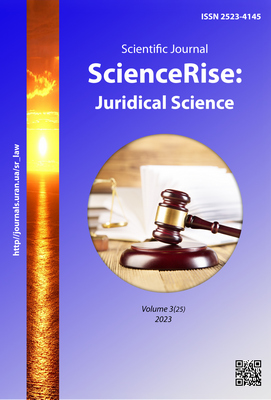Mediation in diplomatic conflicts. Examples from Latin America
DOI:
https://doi.org/10.15587/2523-4153.2023.288466Keywords:
cooperation, diplomacy, mediation, mediators, neutrality, stability, strategies, trustAbstract
Mediation plays a key role in resolving diplomatic conflicts, especially in regions where established relations between countries are of strategic importance. The article explores the importance and effectiveness of mediation in the region by looking at specific cases of their use.
Over the past decades, Latin America has faced many diplomatic disputes related to borders, trade, resources and other important issues. In such a context, mediation has shown its ability to resolve conflicts through third party mediation. The article analyzes successful examples of mediation, such as the resolution of border conflicts between Colombia and Venezuela, and the peaceful settlement of trade agreement disputes between Chile and Peru.
Special attention is paid to the role of mediators and their strategies in overcoming protracted and acute controversies. The importance of neutrality, trust and diplomatic skill in mediation processes is emphasized. In addition, the article analyzes the impact of mediation on long-term relations between countries, emphasizing the positive results in cooperation and reduction of tensions.
By analyzing case studies, the authors emphasize that mediation plays a key role in resolving complex tensions between countries. The article emphasizes the role of mediators and the strategies they use to achieve successful outcomes. Neutrality, trust and diplomatic skill are highlighted as important components of successful mediation.
In the context of Latin America, a region with many diplomatic disputes, the article analyzes examples of successful mediation, such as the resolution of border conflicts and trade disputes. These practical cases confirm mediation's ability to alleviate tensions and promote peaceful conflict resolution
Finally, the article emphasizes that mediation plays an important role in peace and stability in Latin America by facilitating the resolution of diplomatic conflicts. The article's examination of successful practical examples of mediation demonstrates that this method has great potential for resolving complex international disputes and enabling interaction and cooperation between states in the region and beyond.
The main conclusion of the article is that mediation has significant potential for application in diplomatic conflicts in Latin America. It helps to create conditions for cooperation between countries and supports stability in the region. Examining successful case studies and analyzing mediators' strategies makes the article relevant and informative for researchers, diplomats and anyone interested in international relations and conflict resolution
References
- Bassford, H. (2023). Ordinary Man Extraordinary Journey: My Life in the Foreign Service and Beyond Paperback. Henry H Bassford, 288. Available at: https://a.co/d/6QnqFoC
- Biegon, R. (2017). Power in Latin America: Renewing Hegemony. (2017). Routledge, 206. Available at: https://a.co/d/a5Mrq1M
- Bo, S. (2022). Good Arguments: How Debate Teaches Us to Listen and Be Heard. Penguin Press, 352. Available at: https://a.co/d/8E2nWGl
- Harold Eugene, D., Peck, F. T., Finan, J. J. (2018). Latin American Diplomatic History: An Introduction Paperback. Louisiana State University Press, 312. Available at: https://a.co/d/iZGVrsn
- Dominguez, J., Covarrubias, A. (Eds.) (2023). Routledge Handbook of Latin America in the World. Routledge, 496. Available at: https://a.co/d/aiteTxj
- Fortin, C., Heine, J., Ominami, C. (2023). Latin American Foreign Policies in the New World Order: The Active Non-Alignment Option Hardcove. Anthem Press, 304. Available at: https://a.co/d/aZGHIQe
- G20 New Delhi Leaders’ Declaration (2023). New Delhi, 37. Available at: https://www.g20.org/content/dam/gtwenty/gtwenty_new/document/G20-New-Delhi-Leaders-Declaration.pdf
- Gian, L. G., Lambert, P. (Eds.) (2011). Latin American Foreign Policies: Between Ideology and Pragmatism. Palgrave Macmillan, 284. Available athttps://researchportal.bath.ac.uk/en/publications/latin-american-foreign-policies-between-ideology-and-pragmatism
- Stein, J. G. (Ed.) (2018). Diplomacy in the Digital Age: Essays in Honour of Ambassador Allan Gotlieb. Signal, 286. Available at: https://a.co/d/77g99Kq
- Radha, K. (Ed.) (2018). «Negotiating Peace in Deeply Divided Societies: A Set of Simulations. SAGE Publications Pvt. Ltd., 416. Available at: https://a.co/d/hGmRKd8
- Coelho, M. F. P. (2017). The sphere of politics. Universidade de Brasília, 258. Available at: https://catalat.org/book/the-sphere-of-politics
- Sending, O. J., Pouliot, V., Neumann, I. B. (Eds.) (2015). Diplomacy and the Making of World Politics. Cambridge University Press, 382. Available at: https://a.co/d/0BuBgJB
- Kerr, P., Wiseman, G. (2013). Diplomacy in a Globalizing World: Theories and Practices. Oxford University Press, 432. Available at: https://a.co/d/20p0HrF
- Ronald Bruce, St J. (2023). Peruvian Foreign Policy in the Modern Era. Anthem Press, 117. Available at: https://a.co/d/b2stjxM
- Velazquez-Flores, R. (2022). Principled Pragmatism in Mexico's Foreign Policy: Variables and Assumptions. Palgrave Macmillan, 366. Available at: https://a.co/d/0edBWD5
Downloads
Published
How to Cite
Issue
Section
License
Copyright (c) 2023 Maria Zhomartkyzy

This work is licensed under a Creative Commons Attribution 4.0 International License.
Our journal abides by the Creative Commons CC BY copyright rights and permissions for open access journals.
Authors, who are published in this journal, agree to the following conditions:
1. The authors reserve the right to authorship of the work and pass the first publication right of this work to the journal under the terms of a Creative Commons CC BY, which allows others to freely distribute the published research with the obligatory reference to the authors of the original work and the first publication of the work in this journal.
2. The authors have the right to conclude separate supplement agreements that relate to non-exclusive work distribution in the form in which it has been published by the journal (for example, to upload the work to the online storage of the journal or publish it as part of a monograph), provided that the reference to the first publication of the work in this journal is included.








